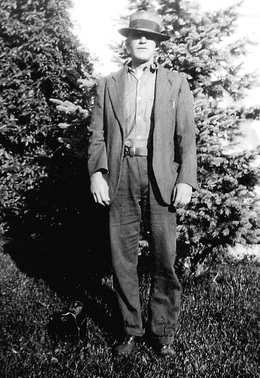 Lynn Richmond--Charlie's Father-In-Law. ©
Lynn Richmond--Charlie's Father-In-Law. ©
MEMORIES OF CHARLIE CLARK & THE QUALITY CASH MARKET
By his son, Charles (also known as Sonny or Chuck) Clark ©
Writing about one’s father is totally self-serving, but conversely it is a subject about which this writer knows a considerable amount. Father was a very honorable man though he surely had his weaknesses. Some people will remember Charlie as one who liked to drink; some will remember him as one of the hardest working men in Victor. His children will remember him as a father who spent his life earning enough money to send his sons to the university and consequently to moderately successful lives. There are a number of miners who remember him for keeping them and their families alive during the darkest days of the District when the mines were closing and many were temporarily or permanently out of work. Charlie Clark was all of these people and more.
Charlie came from a very refined family. His mother was a shirttail relative of two presidents of the United States, William Henry and Benjamin Harrison, and his father was a graduate of the Missouri School of Mines.
His wife, Marguerite was the daughter of one of the toughest miners in Victor, Lynn Richmond, who got his start as a 17-year old hoist man on the Smuggler Mine in Aspen, Colorado. Lynn was constantly in a fight at some bar or working off a hangover. In spite of his rowdy behavior, he seldom missed a shift while working underground in the mines. Marguerite took care of Lynn and her sister, Adelaide, after Lynn’s wife, Sarah, died of influenza in 1918. Marguerite was a very young girl at the time and her life was difficult. Before attending school, she fixed Lynn’s pie can and dressed and fed her sister breakfast. At night she did the day’s laundry, completed the housekeeping, and prepared her father’s dinner (when and if he came home). This is not mentioned as a way to demean Lynn—Marguerite and Adelaide never missed a meal and always had a roof over their heads--though at times they wondered when the money would show up or in a few cases, where the money went.
As a boy, Charlie worked on the Cog Railroad, cleaning up the tracks to the summit of Pikes Peak. He had few aspirations and was content working at any job he might find. He ended up in Victor as a teenager when his father moved to the District. His first job in “the City of Mines” was delivering groceries to Frazier’s customers using a two-horse team. This was no cakewalk in the winter. Just getting to the isolated homes through the deep drifts was somewhat of a miracle. After a hard day, he had to feed his horses, remove their tack, and clean up the horse barn. He spent much of his leisure time in Rosemont breaking horses for the Rathkes who had the Elk Preserve with tall eight-foot fences surrounding the property. One thing led to another and he had a chance to learn the butcher trade at the KC Market with Bill and Cora Hatcher. He enjoyed being a butcher and eventually became one of the most proficient in the District.
By his son, Charles (also known as Sonny or Chuck) Clark ©
Writing about one’s father is totally self-serving, but conversely it is a subject about which this writer knows a considerable amount. Father was a very honorable man though he surely had his weaknesses. Some people will remember Charlie as one who liked to drink; some will remember him as one of the hardest working men in Victor. His children will remember him as a father who spent his life earning enough money to send his sons to the university and consequently to moderately successful lives. There are a number of miners who remember him for keeping them and their families alive during the darkest days of the District when the mines were closing and many were temporarily or permanently out of work. Charlie Clark was all of these people and more.
Charlie came from a very refined family. His mother was a shirttail relative of two presidents of the United States, William Henry and Benjamin Harrison, and his father was a graduate of the Missouri School of Mines.
His wife, Marguerite was the daughter of one of the toughest miners in Victor, Lynn Richmond, who got his start as a 17-year old hoist man on the Smuggler Mine in Aspen, Colorado. Lynn was constantly in a fight at some bar or working off a hangover. In spite of his rowdy behavior, he seldom missed a shift while working underground in the mines. Marguerite took care of Lynn and her sister, Adelaide, after Lynn’s wife, Sarah, died of influenza in 1918. Marguerite was a very young girl at the time and her life was difficult. Before attending school, she fixed Lynn’s pie can and dressed and fed her sister breakfast. At night she did the day’s laundry, completed the housekeeping, and prepared her father’s dinner (when and if he came home). This is not mentioned as a way to demean Lynn—Marguerite and Adelaide never missed a meal and always had a roof over their heads--though at times they wondered when the money would show up or in a few cases, where the money went.
As a boy, Charlie worked on the Cog Railroad, cleaning up the tracks to the summit of Pikes Peak. He had few aspirations and was content working at any job he might find. He ended up in Victor as a teenager when his father moved to the District. His first job in “the City of Mines” was delivering groceries to Frazier’s customers using a two-horse team. This was no cakewalk in the winter. Just getting to the isolated homes through the deep drifts was somewhat of a miracle. After a hard day, he had to feed his horses, remove their tack, and clean up the horse barn. He spent much of his leisure time in Rosemont breaking horses for the Rathkes who had the Elk Preserve with tall eight-foot fences surrounding the property. One thing led to another and he had a chance to learn the butcher trade at the KC Market with Bill and Cora Hatcher. He enjoyed being a butcher and eventually became one of the most proficient in the District.
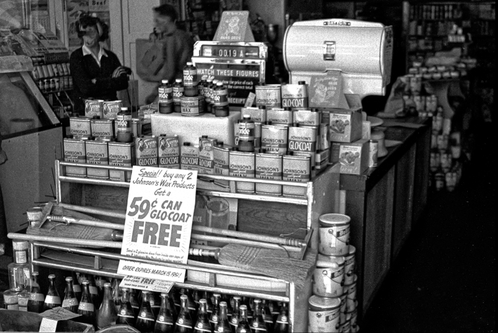 Display Counter at Charlie Clark's Quality Cash Market at 305 Victor Ave. In recent years, Charlie's building housed the "Potter's Inn" and the "Highlander Meeting House". ©
Display Counter at Charlie Clark's Quality Cash Market at 305 Victor Ave. In recent years, Charlie's building housed the "Potter's Inn" and the "Highlander Meeting House". ©
He temporarily settled down and started to raise a family. The first child Marguerite delivered died almost immediately. She then had a boy and four years later, a set of twins who also came close to dying of typhoid fever. Charlie still had a drinking problem and spent many days in embarrassing situations, so much so that he was terminated by the Hatchers. This was a sad time for his wife and children as he could not find a job and was running out of money. He tried mining, but decided this vocation was not for him. He had made a number of friends and he decided he would start a grocery store. One of Charlie’s friends was Jim Mcullough, a future mayor of Colorado Springs. Jim loaned my father money and staked him in the store at 305 Victor Avenue. This was an adventurous move as there were already five grocery stores in Victor: the Arapaho run by Walt Rounds, Olsen & Flanagan where Dave Flanagan was the butcher, Downs was run and owned by Dave Downs, Zitniks was owned by the Zitniks, and the KC Market was owned by Cora Hatcher (Bill passed away).
Charlie named the store the Quality Cash Market, somewhat of a misnomer as few paid cash upon delivery and some never paid at all! Tabs were run by the month as many leasers were living hand to mouth. This turned out to be a credit business almost totally.
Charlie named the store the Quality Cash Market, somewhat of a misnomer as few paid cash upon delivery and some never paid at all! Tabs were run by the month as many leasers were living hand to mouth. This turned out to be a credit business almost totally.
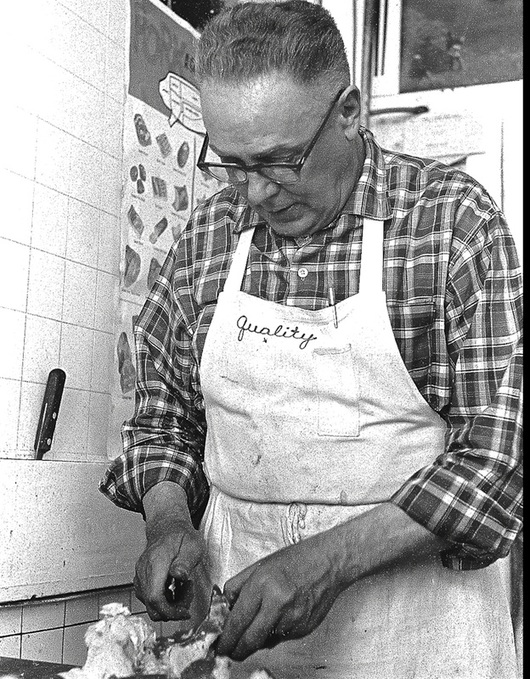 Charlie Clark at Work ©
Charlie Clark at Work ©
Father carried only the finest brands and his meat case was a showpiece. He made his own sausage, brined his own pickles, and made sauerkraut in the rooms above the store. He ordered specialty items for the miners who came from many countries to work in Victor and Cripple Creek. On some occasions the Clarks were blessed with a suckling pig or other unusual items ordered by Wilhelmina Denman for a party she planned, then postponed—post facto. The small store had it all and soon was very successful. The groceries were ordered during the morning and delivered to the homes every afternoon five days of the week. On Saturday and holidays there were two deliveries. These were good times although it was becoming more difficult to make a living.
As time went on, many of the miners, who were working full time, were company workers and many spent their money in the Company Store at the Cresson Mine. My father felt the pinch and used to get angry at select miners that went to some other vendor after he had let them run up a large bill at the store. When father asked for some money to apply to the bill, they changed their loyalty to another store or went to Cripple Creek or Colorado Springs to buy their groceries for cash.
The good times faded when the mines shut down one by one. Some miners were prophetic and left the District for uranium mines on the Western Slope or to Climax near Leadville. Some were too old to start over and remained in the District. They spent their time sitting on a ledge outside the Gold Coin while massaging a rumor that a certain mine was opening, or a large company was buying the Golden Cycle Corporation and would be hiring many miners. This seldom proved true, but rumors persisted. Many of the miners were on the Old Age Pension and many had advanced stages of silicosis. Optimism never waned, however, and Charlie and the skeleton crew that remained always had visions of good things to come.
These were desperate times and Charlie spent long hours at the butcher’s block trimming every ounce off the bones and trying to make the store more efficient. His children wondered why he had no time to attend their basketball games or concerts at the auditorium, but when the activities were over, Ken, Keith, and Sonny went down to the Quality Cash Market and found Charlie working, making hamburger, writing up Saturday’s specials, or washing a huge pile of dishes and trays. His days were usually 7:00 a.m. to 11:00 p.m.
Marguerite usually remained awake and prepared a warm dinner for Charlie. After dinner, he generally fell asleep in his chair in the warm kitchen and had to be awakened and helped to bed. This schedule went on for many years and it took its toll on Charlie’s health. Living and working at 10,000 feet contributed to polysythemia, a condition that produced an over- abundance of red blood cells. As a result, Charlie contributed many pints of blood to the Penrose Hospital’s Blood Bank.
During this low ebb in Victor’s economy, Charlie kept many families alive. He sent free groceries to a number of families who had little or no income. He delivered free turkeys at Thanksgiving and Christmas. He gave away fruit and vegetables whose cosmetics had seen better days on the produce trays. He furnished bags of fruit, candy and nuts for the popular celebration at City Hall at Christmas. He did a lot for Victor, but was very silent in his generosity.
Since freight costs were too great to be economically feasible, Charlie bought a used ’40 Ford pickup, had Clayton Fellabaum beef up the springs and put oversize tires on the rear. With this vehicle he made regular trips to the Commission Row in Colorado Springs. Here were businesses that supplied the store with fresh produce, poultry, eggs, fish, meat, and other staples his customers required. The names of many of these businesses were: National Commission Company, Marks Brothers, Joslin Produce, Stevenson Produce, Hollywood Creamery, Puffer Mercantile, Capitol Packing Company, and Carnation Creamery.
As time went on, many of the miners, who were working full time, were company workers and many spent their money in the Company Store at the Cresson Mine. My father felt the pinch and used to get angry at select miners that went to some other vendor after he had let them run up a large bill at the store. When father asked for some money to apply to the bill, they changed their loyalty to another store or went to Cripple Creek or Colorado Springs to buy their groceries for cash.
The good times faded when the mines shut down one by one. Some miners were prophetic and left the District for uranium mines on the Western Slope or to Climax near Leadville. Some were too old to start over and remained in the District. They spent their time sitting on a ledge outside the Gold Coin while massaging a rumor that a certain mine was opening, or a large company was buying the Golden Cycle Corporation and would be hiring many miners. This seldom proved true, but rumors persisted. Many of the miners were on the Old Age Pension and many had advanced stages of silicosis. Optimism never waned, however, and Charlie and the skeleton crew that remained always had visions of good things to come.
These were desperate times and Charlie spent long hours at the butcher’s block trimming every ounce off the bones and trying to make the store more efficient. His children wondered why he had no time to attend their basketball games or concerts at the auditorium, but when the activities were over, Ken, Keith, and Sonny went down to the Quality Cash Market and found Charlie working, making hamburger, writing up Saturday’s specials, or washing a huge pile of dishes and trays. His days were usually 7:00 a.m. to 11:00 p.m.
Marguerite usually remained awake and prepared a warm dinner for Charlie. After dinner, he generally fell asleep in his chair in the warm kitchen and had to be awakened and helped to bed. This schedule went on for many years and it took its toll on Charlie’s health. Living and working at 10,000 feet contributed to polysythemia, a condition that produced an over- abundance of red blood cells. As a result, Charlie contributed many pints of blood to the Penrose Hospital’s Blood Bank.
During this low ebb in Victor’s economy, Charlie kept many families alive. He sent free groceries to a number of families who had little or no income. He delivered free turkeys at Thanksgiving and Christmas. He gave away fruit and vegetables whose cosmetics had seen better days on the produce trays. He furnished bags of fruit, candy and nuts for the popular celebration at City Hall at Christmas. He did a lot for Victor, but was very silent in his generosity.
Since freight costs were too great to be economically feasible, Charlie bought a used ’40 Ford pickup, had Clayton Fellabaum beef up the springs and put oversize tires on the rear. With this vehicle he made regular trips to the Commission Row in Colorado Springs. Here were businesses that supplied the store with fresh produce, poultry, eggs, fish, meat, and other staples his customers required. The names of many of these businesses were: National Commission Company, Marks Brothers, Joslin Produce, Stevenson Produce, Hollywood Creamery, Puffer Mercantile, Capitol Packing Company, and Carnation Creamery.
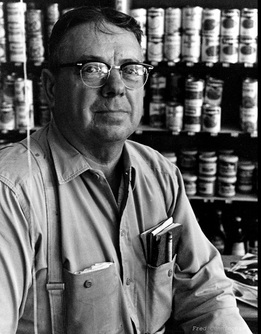 Fred Cunningham Delivered Bread to the Quality Cash Market ©
Fred Cunningham Delivered Bread to the Quality Cash Market ©
As soon as Sonny could carry his own weight, he accompanied his father on most of the trips below. The trip back to Victor was always an adventure, the big challenge being Four Mile Hill. This was prior to the Midland Terminal Railroad being abandoned and it was necessary to take the Four Mile route to the District. In the summer, the little red Ford with its underpowered flathead v8 usually boiled and vapor locked. Another big problem was getting a decent set of tires during the war when the only types of tires were re-treads or newly developed synthetic tires. Charlie usually had at least one flat tire per trip because of the heat and the heavy loads on the truck. In the winter, the snow usually dictated putting on snow chains at the bottom of Four Mile Hill. This was a complicated job because of the heavy loads on the truck. Trips to the “Springs” were not easy and sometimes cost more than Charlie saved on the freight bills. John Pflug kept Charlie in tires during the war. Charlie never forgot that fact and compensated him in numerous ways over time.
Come rain, come shine, one vendor never missed a day delivering bread to the stores. His name was Fred Cunningham, but everyone called him Town Talk. He was as familiar to the people in the District as any “native” would have been.
Come rain, come shine, one vendor never missed a day delivering bread to the stores. His name was Fred Cunningham, but everyone called him Town Talk. He was as familiar to the people in the District as any “native” would have been.
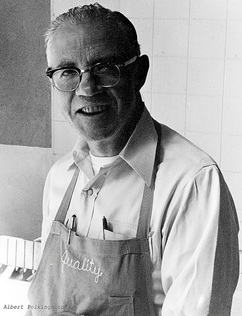 Albert Polkinghorn ©
Albert Polkinghorn ©
It would be remiss not to mention the employees of the store during its existence. Charlie was very fortunate to have a group of dedicated and loyal employees working with him during this time. Two remain in focus: Albert (Polky) Polkinghorn and Francis (Fratter) McLaughlin. These two employees worked diligently for Charlie for many years until they were called to World War II during the early forties. When they returned to Victor from Germany and Italy respectively, both resumed their jobs at the Quality Cash Market. Albert worked for Charlie until he sold the store and moved to Colorado Springs. Fratter tragically died in his new Chevrolet when he broadsided a rock in Woodland Park.
During World War II, there were changes as most eligible young men went to war. Murray Cherguin, an affable rancher and friend of Charlie, Marguerite (Charlie’s wife), Buddy Moss, Buddy May and Charlie’s three young sons attempted to fill the gap until the “boys” came back from the war. This was the time of rationing and there was a shortage of many items. Deliveries were reduced, as gasoline was in short supply or not available at all. These years were leaner then most.
During World War II, there were changes as most eligible young men went to war. Murray Cherguin, an affable rancher and friend of Charlie, Marguerite (Charlie’s wife), Buddy Moss, Buddy May and Charlie’s three young sons attempted to fill the gap until the “boys” came back from the war. This was the time of rationing and there was a shortage of many items. Deliveries were reduced, as gasoline was in short supply or not available at all. These years were leaner then most.
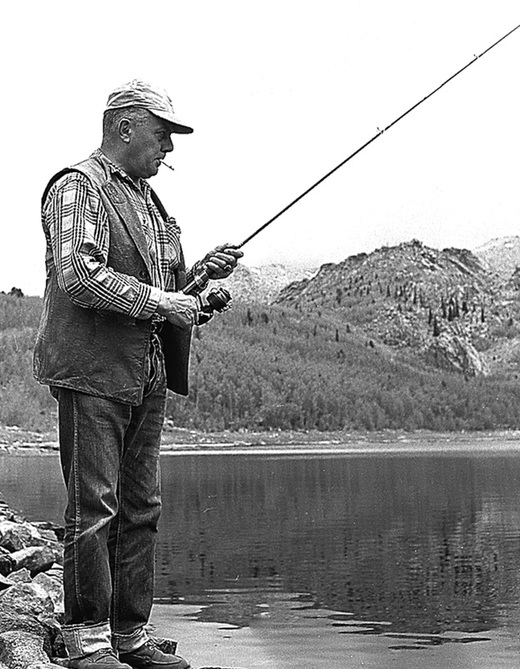 Charlie Clark at Bison Reservior ©
Charlie Clark at Bison Reservior ©
In spite of the tough times, there were many good experiences in the years that passed. Charlie loved fishing and hunting and reluctantly used the Sabbath (his only day of rest) to take advantage of that fact.
In the summer, Sunday mornings were reserved for a trip to Bison Reservoir. Charlie and the family arose at daylight, went to the Quality Cash Market to pick up the necessary fishing apparel and equipment, made sandwiches, and drove the short and delightful trip to Bison. Charlie established his favorite fishing spot and worked hard to catch the Native trout.
His children spent most of the time hiking and exploring the Red Rocks, the Wire and Kiwanis cabins, hiking the three miles to No. 2, and following the pipeline back to Bison. Their fall activities included picking wild raspberries, gooseberries, and the tiny, elusive and delicious wild strawberries.
In the fall, the family also went to 39 Mile, a mountain near Guffy. Here, Charlie and the boys met Sam Thorpe, Gene Thorpe, Obie, and Merle Curtis. Charlie taught his boys how to successfully hunt deer.
These times were precious to the whole family. The trips were mainly a bonding exercise and were indelibly entrenched in everyone’s brain. In retrospect, Charlie was a wonderful father, a generous and caring businessman, a friend to most who got to know him, and last but not least, he was MY DAD and he is still sorely missed!!
© Charles Clark
ABOUT THE AUTHOR:
Charles (Chuck) Clark was born in Colorado Springs, Colorado in 1933. His father was a grocer and his mother was a teacher. He was raised in Victor, graduated from Victor High School in 1951, and four years later graduated from the University of Colorado with a degree in English Literature and a Commission as an Ensign in the U.S. Navy. Later he received a Masters Degree from Colorado College.
After his service obligation and becoming a pilot, Chuck was a teacher, probation officer, photographer, marketing manager and vice president of several companies. He traveled to Peru twice and accumulated and sold numerous photographs of the Amazon and its indigenous people. In 2011, he was elected a Member of the famed National Explorer's Club headquartered in New York city. He is the second Victorite to gain membership in the exclusive Explorer's Club. The first was Lowell Thomas.
Chuck recorded many of the experiences he had as a child in Victor in a 2011 book titled "Memories of a Wonderful Childhood in Victor, Colorado" -- which can be obtained from the gift shop of the Victor-Lowell Thomas Museum or ordered online. This memory of "Charlie Clark and the Quality Cash Market" (not included in his book) was submitted in October, 2015.
In the summer, Sunday mornings were reserved for a trip to Bison Reservoir. Charlie and the family arose at daylight, went to the Quality Cash Market to pick up the necessary fishing apparel and equipment, made sandwiches, and drove the short and delightful trip to Bison. Charlie established his favorite fishing spot and worked hard to catch the Native trout.
His children spent most of the time hiking and exploring the Red Rocks, the Wire and Kiwanis cabins, hiking the three miles to No. 2, and following the pipeline back to Bison. Their fall activities included picking wild raspberries, gooseberries, and the tiny, elusive and delicious wild strawberries.
In the fall, the family also went to 39 Mile, a mountain near Guffy. Here, Charlie and the boys met Sam Thorpe, Gene Thorpe, Obie, and Merle Curtis. Charlie taught his boys how to successfully hunt deer.
These times were precious to the whole family. The trips were mainly a bonding exercise and were indelibly entrenched in everyone’s brain. In retrospect, Charlie was a wonderful father, a generous and caring businessman, a friend to most who got to know him, and last but not least, he was MY DAD and he is still sorely missed!!
© Charles Clark
ABOUT THE AUTHOR:
Charles (Chuck) Clark was born in Colorado Springs, Colorado in 1933. His father was a grocer and his mother was a teacher. He was raised in Victor, graduated from Victor High School in 1951, and four years later graduated from the University of Colorado with a degree in English Literature and a Commission as an Ensign in the U.S. Navy. Later he received a Masters Degree from Colorado College.
After his service obligation and becoming a pilot, Chuck was a teacher, probation officer, photographer, marketing manager and vice president of several companies. He traveled to Peru twice and accumulated and sold numerous photographs of the Amazon and its indigenous people. In 2011, he was elected a Member of the famed National Explorer's Club headquartered in New York city. He is the second Victorite to gain membership in the exclusive Explorer's Club. The first was Lowell Thomas.
Chuck recorded many of the experiences he had as a child in Victor in a 2011 book titled "Memories of a Wonderful Childhood in Victor, Colorado" -- which can be obtained from the gift shop of the Victor-Lowell Thomas Museum or ordered online. This memory of "Charlie Clark and the Quality Cash Market" (not included in his book) was submitted in October, 2015.
THE PAST MATTERS. PASS IT ALONG.
The Next Generation Will Only Inherit What We Choose to Save and Make Accessible.
Please Share Your Memories and Family Connections to Victor & the World's Greatest Gold Camp
By Contacting Victor Heritage Society, PO Box 424, Victor, CO 80860 or e-mail [email protected].
The Next Generation Will Only Inherit What We Choose to Save and Make Accessible.
Please Share Your Memories and Family Connections to Victor & the World's Greatest Gold Camp
By Contacting Victor Heritage Society, PO Box 424, Victor, CO 80860 or e-mail [email protected].
VictorHeritageSociety.com
Copyright © 2023 Victor Heritage Society. All Rights Reserved.
Copyright © 2023 Victor Heritage Society. All Rights Reserved.